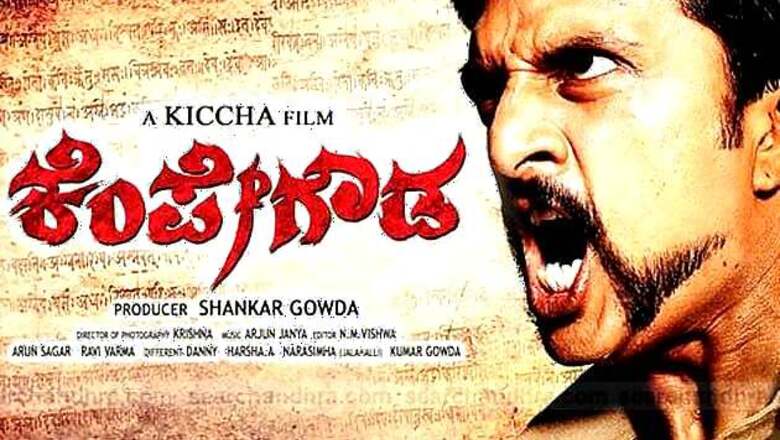
views
Bangalore: Perhaps Karnataka is the only state where dubbing from other languages into Kannada is not allowed. Movies, television serials and all other visual entertainment contents in other languages are not allowed to be dubbed into Kannada. This ban has been in force for more than 50 years. According to legal experts the ban itself is unconstitutional. Our Constitution allows freedom of expression and free movement of people and languages within the country. No state can discriminate against the other languages. Even though the ban on dubbing is unofficial, it works almost like a government imposed ban.
These days, some young Kannadiga professionals have been fighting against this ban. They argue that the ban helps some vested interests in the film and other entertainment industries and these vested interests are forcing the government to back this 'unconstitutional' ban.
Vasant Shetty, an IT professional from Bangalore has been spearheading a movement against the ban on dubbing for the past few years. He is also running an online campaign against the ban describing it as the 'Talibanisation of Kannada Cinema'. In an article posted on www.churumuri.com, Shetty argues that the ban has no legal sanctity and is put in place by some private trade bodies like Karnataka Film Chamber of Commerce (KFCC) and other similar organizations.
He writes "Bangalore is home to "Sandalwood", the Kannada film industry. The industry produces 120-130 movies an year and, like other major film industries in India, has about a 10% success rate.
Unfortunately, unlike other film industries, Sandalwood is known for banning dubbing of content to Kannada. This unofficial ban on dubbing content effectively isolates Kannadigas who know only Kannada (approximately there are 2.5 to 3 crore Kannadigas who know only Kannada and no other language) from the sea of knowledge and entertainment that exists in other languages.
We must note that the ban has no legal sanctity and is put in place by a private trade bodies like Karnataka film chamber of commerce (KFCC) and other similar organizations. The private ban was put in place six decades ago in order to give boost to the then ailing Kannada film industry under the aegis of the legendary actor Dr Raj Kumar. The protectionist measure helped the novice industry to scale from less than 10 films a year to more than 100 films a year. But like other typical protectionist schemes, the continued "PRIVATE" protection has resulted in isolating Kannadigas from receiving worldly knowledge in visual form and is fast turning counter-productive from the view point of increasing language's reach. Several past attempts by concerned individuals to debate the unconstitutional ban on dubbing was shot down in the guise of protecting of language and culture by vested interests. Last year when the Hindi cinema actor Aamir Khan set out to do a social awareness program called 'Satyameva Jayate', he wanted to make this program available in most Indian languages using the means of dubbing".
He argues that there is nothing to debate as the ban itself is illegal and whoever wants to see original content, they should have their choice, and whoever wants to see dubbed content, they should have their choice too.
Internationally known knowledge channels like TLC, Discovery, National Geographic, History, Animal Planet etc have not also been able to enter the Kannada market due to this ban. A majority people who are against the ban feel that it is depriving crores of Kannadigas from widening their horizons and the ban is keeping them ignorant.
The film and other entertainment industry people who are for the ban argue that allowing the dubbed content will destroy the local Kannada film and entertainment industry. A veteran of the film industry said "if we allow dubbing, hundreds of Tamil, Telugu, Malayalam, Hindi and English other language movies and television content will flood the marker. It will kill the local talent and eventually Kannada film industry. Some big business interests are behind the movement against the ban. We will never allow the ban".
The people who are fighting against the ban counter him saying that if the people can watch non-Kannada content with sub-titles, why they can't watch the same content with voice over in Kannada.
The demand for and against the ban has divided the Kannada literary world too. Some argue that if we can have translated works in Kannada, why we can't have dubbed works.
One more interesting and somewhat disturbing aspect of Karnataka is the influence some Kannada writers and the film industry wield over the government. In the name of protecting the interests of the state, these lobbies have been dictating the terms to the government since mid-1960s. The people in power are scared of these people and mostly listen to them. A top ranking minister in the Karnataka government said "we know that the ban is illegal and it should be lifted. But, who will bell the cat? We have allowed these so called protectors of Kannada to become too big. Now they are out of control. Even the media in Kannada is also backing such people in the name of protecting Kannada interests".
According to a report the Karnataka film industry is now grappling with a notice from the Competition Commission of India (CCI), which seeks to know why dubbed films shouldn't be released in the state.
According to another report, the Kannada film industry is not the only one in the country to oppose dubbing. It claims that Gujarat, West Bengal and Punjab have also put a similar ban in place.
The matter is now being heard by the High Court of Karnataka. Internet activists like Vasant Shetty hope that the High Court will declare the ban unconstitutional and allow free flow of thoughts from all over the World into Kannada. They argue that the vested personal interests of a few trade bodies and some writers can't be equated with the larger interests of the Kannadiga populace.




















Comments
0 comment